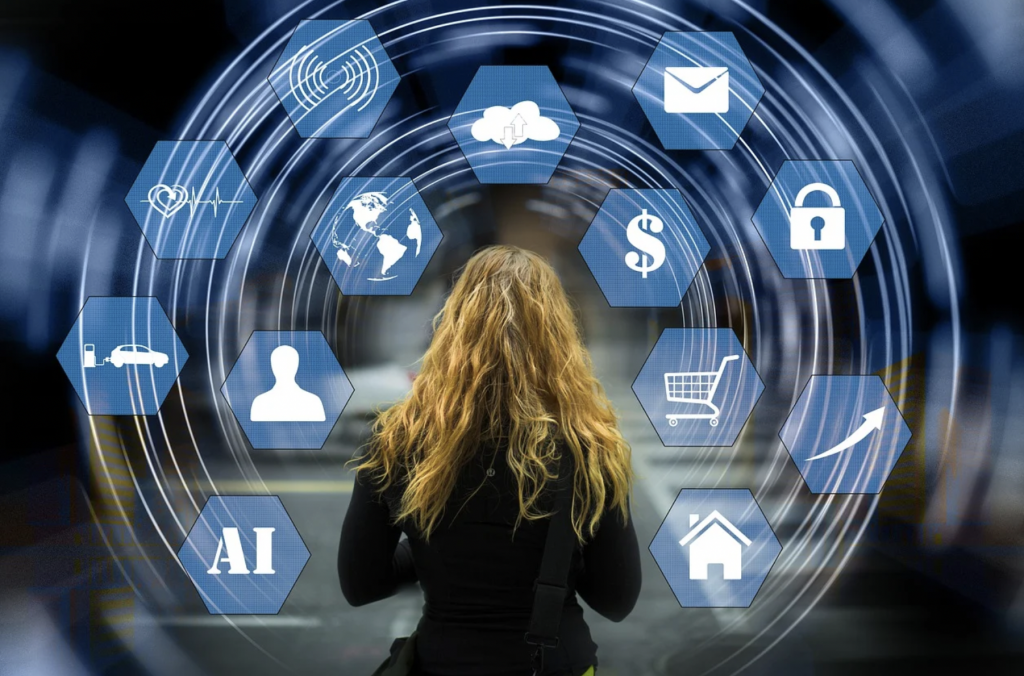Artificial intelligence (AI) has been around for so long that you would almost be right in assuming that the technology is already very established. However, the truth is that it’s still developing and will continue to learn,grow and evolve over time. This blog will go into detail about how it is helping us today as well as investigating what the future of AI holds.
1. Healthcare
For years we’ve hoped that AI will have the ability to transform the healthcare landscape, and now it looks like it’s beginning to get there.
Early cancer detection
One thing we know is that detecting cancer early increases a patient’s chances of survival. Deep learning-powered AI is steadily being rolled out to detect certain cancers. In 2018, initial studies found that the technology had a higher detection rate of skin cancers than dermatologists. On average, an AI machine accurately detected 95% of skin cancers from images – compared to 86.6% for humans. The same technology has shown excellent promise in being able to diagnose breast cancer, in an at least equivalent performance compared to pathologists.
Deep learning AI has also been successful in being able to predict the development of certain cancers, including liver, rectum and prostate. Going forward this will aid in the decision-making of what treatments can be put in place – identifying and monitoring individuals who have a higher risk of developing certain cancers.
Identifying early-stage heart disease
Consumer wearables, such as FitBits and smartwatches have gradually become mainstream. Some of these devices are fitted with a built-in electrocardiogram, with the purpose of measuring how well the heart is working – spotting any cardiac irregularities. This, coupled with AI, has proven to be extremely effective in being able to spot early-stage heart disease. Doctors are then able to more effectively monitor, and treat those at risk before they potentially suffer a life-threatening episode, such as a cardiac arrest.
2. Climate change
For the most part it’s widely accepted that climate change is the most significant threat to life as we know it. Yet it remains one of the world’s most challenging problems to solve. However, some experts believe that machine learning AI may go a long way in finding a solution. ‘Tackling Climate Change with Machine Learning’ by contributors including Google AI and Microsoft Research identified 13 areas where this technology can be deployed, including transportation, CO2 removal and climate prediction.
Climate prediction
Machine learning has made huge strides in state-of-the-art climate prediction. AI is able to use data from past climate conditions and predict future extreme weather events. This gives local communities sufficient time to prepare for flood, for example – by stockpiling, getting home and putting up flood defences.
Transportation
The 2019 paper comments that transportation has not made the significant progress in lowering its CO2 emissions that other sectors have. It says that machine learning can play a pivotal role in helping the industry reduce the amount of greenhouse gases (GHG) it produces. With the large volumes of transportation occurring each day, so much inefficient mileage creates needless GHG emissions. Machine learning is able to interpret transport data, reduce the time spent on long haul trips and even identify alternatives to transportation.
Energy production
Machine learning has the potential to help overall energy consumption and look ahead towards using cleaner electricity. The technology has the ability to identify opportunities to reduce GHG emissions from electricity systems.
3. Fake news
Social media has produced a troubling era of fake news and misinformation. The main issue is that such information spreads like wildfire, causing chaos and confusion. AI has been pinpointed as one of the key drivers in pushing fake news across the internet, sowing seeds in social media platforms. With trillions of posts going out across the likes of Twitter and Facebook, manual monitoring is impossible. So, social media platforms have begun deploying AI technologies such as machine learning and natural language processing to automatically assess the truth of articles posted online. While not currently the perfect solution, right now it’s the best we’ve got and, as it learns, it will get better over time.
4. Customer service
Once solely run by people, AI has gradually changed the customer service process. For better or worse, technology has massively helped to reduce workloads for employees and has cut overheads for companies looking to improve profit margins. However, some consumers do view chatting to an AI chatbot as a more complicated process and prefer speaking to an actual person. So it’s up to the company to juggle reducing costs while ensuring a positive customer experience.
5. Education
Knowledge Space Theory
Utilising the Knowledge Space Theory (KST), AI is beginning to provide students with a more personalised education, plugging gaps in their knowledge. It can tailor studies to a student’s needs, boosting efficiency. The KST takes into account the complexity of different subjects, knowledge structures and knowledge spaces to pave the way for learning paths that students can take.
Moving online
With the help of AI, online education has made huge strides in ensuring that students have access to 24/7 learning. It can help them build schedules based on their most productive hours of the day. Lessons can be moved online, with digital textbooks available to students as well as impressive simulations and visualisations.
Summary
These have been just five of the seemingly limitless ways new and exciting technology is helping us. The future of AI is full of unknowns. As it learns and becomes more developed, the sky really is the limit. Some snags do remain over some aspects of AI, such as its role in customer service and how much it can contribute to spreading misinformation. However, as it stands, the advantages really outweigh the disadvantages and long may that continue.

